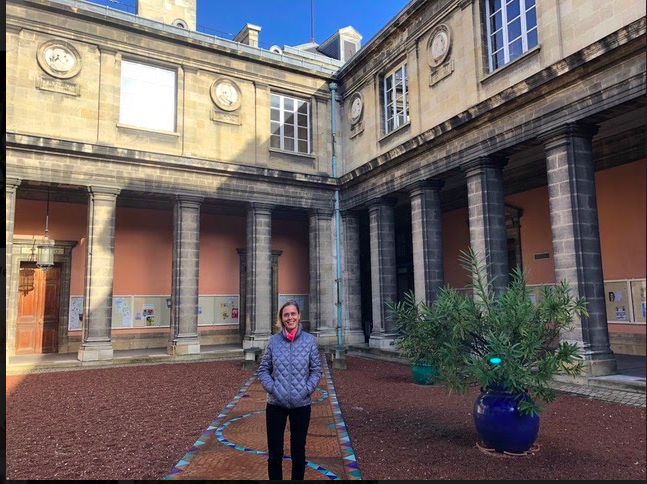
Saint Mary’s Professor Helga Lenart-Cheng Uses Fulbright Award to Study European Refugee Crisis
In January of 2018, Saint Mary’s Associate Professor of World Languages and Cultures Helga Lenart-Cheng learned she had been awarded a prestigious Fulbright U.S. Scholar Award. The award allowed her to spend six months at the University of Bordeaux Emile Durkheim Center of Research, studying the European refugee crisis and how the testimonies of refugees and migrants are currently being recorded in France, in particular at museums focusing on the experience of migration.
“The purpose of my Fulbright grant was to research archives of immigrant stories in France,” said Lenart-Cheng. “I’m a comparatist by training, focusing mostly on the literary aspects and cultural history of autobiographical storytelling (diaries, blogs, memoirs, autobiographies across centuries and cultures). This time, however, instead of analyzing immigrants’ stories from a literary perspective, I wanted to focus on their politico-ethical aspects.”
“In recent years, personal stories have become a privileged means of immigrant rights activism on both sides of the Atlantic,” Lenart-Cheng continued. “According to activists, immigrants’ personal stories promise a glimpse behind the headlines and a more humane way to connect to our new neighbors.”
“Immigrants’ autobiographical stories feature prominently in the media, and migration museums play a special role in this new type of story-activism,” Lenart-Cheng added. “In the last decade, the number of migration museums has multiplied all over the world.”
Lenart-Cheng is most interested in the political positioning of migration trauma, as reflected in each historical period’s different archiving practices. A key resource for her was the French National Museum for the History of Immigration in Paris and its story collection called The Gallery of Gifts.
Lenart-Cheng’s research focused on the following questions: “What does it mean to exhibit stories of immigrants in a public space reserved for objects considered of shared national value? What purpose do these stories serve beyond educating the host society about their new neighbors? What kind of recognition is implied in the celebration of immigrants’ stories? And to what extent can these stories expand the limits of hospitality and our notion of democracy?” Comparing the French collection to the Ellis Island Oral History Archive, she also studied the differences between American and French museological approaches.
Like other European Union countries, France has experienced an unparalleled flood of refugees and migrants over the past three years. More than 1 million people, most fleeing war and terror in Syria and other countries, have sought safe harbor in EU countries, with more than 300,000 settling in France.
Lenart-Cheng’s research under the Fulbright allowed her to temporarily shift gears from studying literature to examining psychological, ethical, and political aspects of immigrants’ lives—through their stories. The research transcends literature because autobiographical storytelling is “more than a literary genre,” Lenart-Cheng said recently. “It’s a fundamental element of our lives. Even the most taciturn among us are constantly rehearsing, if only in our heads, stories about who we are. We are highlighting certain elements of our family’s and community’s story, suppressing others, telling stories about who we are and how we arrived here.”
“For the Fulbright work, I decided to write about how societies use, misuse, and abuse immigrant storytelling. These are political questions: Who initiates and funds these story collection projects? Who holds the microphone and why? Which immigrant groups’ stories are being collected today and whose stories were collected in the past? Where are these stories being preserved and who can access them? I’ve already been working on U.S. archives, and this time I wanted to explore French archives, and eventually compare them.”
Lenart-Cheng grew up in Hungary, where she studied French and German. She received her PhD in Comparative Literature from Harvard. A Saint Mary’s professor for more than 10 years, Lenart-Cheng is the co-author of the 2016 book Lénárd Sándor: Világok vándora (Alexander Lenard: Wanderer of Worlds), and her scholarship has appeared in many books and academic journals, including American Studies/Amerikastudien, Auto/Biography Studies, Biography, Cultural Politics, Hungarian Cultural Studies, New Literary History and St. Johns Humanities Review.